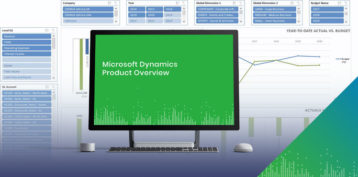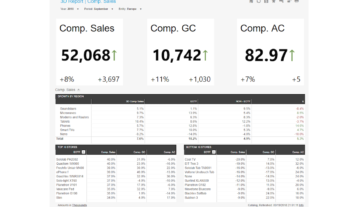Meeting the Challenge of Operational Reporting in Microsoft D365BC

Successful companies make data-informed decisions. But what happens if data is inaccurate, inaccessible, or in a format that makes analysis difficult for the average business user? When that happens, making data-informed decisions becomes slow and painful, if not impossible.
In 2018, Microsoft launched Microsoft Dynamics 365 Business Central or Microsoft D365BC, a new Cloud-based ERP solution designed to replace previous versions of the software. Though the software offers several advantages over previous versions, finance teams using Microsoft D365BC may experience some challenges in the areas of operational and financial reporting.
One general Microsoft D365BC reporting challenge comes from the ERP’s complex data table structure. Finance teams have different reporting needs than those of other departments, and the complexity of Microsoft D365BC’s underlying data tables makes it difficult for non-technical users to find the data they need for financial and operational reporting.
Out-of-the-box reporting tools for Microsoft D365BC are not built to be finance-friendly, and often customizations are required for operational reporting. Smaller businesses that use Microsoft D365BC may struggle to find the necessary IT resources to build such customized reports.
Other Challenges of Operational Reporting in Microsoft D365BC
Here are some of the most common operational reporting roadblocks finance teams that use Microsoft D365BC encounter.
No Single Source of Truth for Operational Reporting
By its nature, operational reporting often requires finance teams to look beyond the data found in the general ledger and combine them with data from other Dynamic modules or even external sources. For example, it is not unusual for finance teams to need data from CRMs or other business applications to add to ERP data for a comprehensive operational report. Microsoft D365BC does not provide an easy way to combine data from all these different databases, leaving business users to design workarounds to meet their reporting needs.
Monthly Financial and Operational Reporting Is Extremely Time-Consuming
Because Microsoft D365BC does not enable drill-down capabilities for financial reporting or facilitate the easy merger of data from multiple sources into a single source of truth, finance teams often resort to manual data dumps, copy/pasting data from various sources into static spreadsheets for analysis. This manual data manipulation is both time-consuming and worryingly error prone.
Increased Risk of Data Inaccuracies
Despite the best efforts of any finance team, more manual manipulation of data typically results in more inaccuracies in those data. That is especially the case when data originates from disparate sources and you may need to convert it to a different format or structure before you combine it with other data in your spreadsheet. Automation with standardized rules prevents many errors in this process, but overriding automation in favor of manual processing opens the door to increased data inaccuracy and all its attendant risks.
Report Customization Requires Heavy IT Dependence
Because the standard reports included with Microsoft D365BC do not address all the operational reporting needs of organizations, finance teams must choose how to get the reports they need. Whether you have an internal IT department or need to work with outside consultants, report customization for Microsoft D365BC requires specialized skills. Then, you must maintain those customized reports and sometimes even modify them down the road. The heavy dependence on IT expertise for report customization is a burden for many businesses in terms of both time spent waiting for reports to be built and money spent on internal IT staffing or external consultants.
Due to these and other common operational reporting challenges with the ERP, Microsoft D365BC recommends that enterprises use Power BI, custom reporting (SSRS), or third-party software for reporting and analysis.
A Better Way Forward with insightsoftware
As a Microsoft Gold Application Development Partner, insightsoftware offers companies that use Microsoft D365BC a better way forward, a way to streamline their operational reporting with powerful solutions purpose-built for finance teams.
Our Jet Analytics and Jet Reports software seamlessly integrate with Microsoft D365BC to simplify processes and speed up financial and operational reporting. Designed for business users, our purpose-built financial and operational reporting software delivers the business insights you need in a way that works for even the most non-technical user.
With insightsoftware’s operational reporting solutions, you get:
A Single Version of the Truth
Jet Analytics enables you to pull data from different systems, transform them as needed, and build a data warehouse and cubes or data models structured so that business users can access the information they need without having to understand the complexities of the underlying database structure.
Businesses can automate the processes to transform and combine legacy data together with current data from multiple sources, in one consolidated reporting and analytics platform. The point-and-click data warehouse automation allows for BI customization that’s 5x faster than manual coding.
Streamlined Monthly Reporting
You can say goodbye to copying, pasting, and manipulating data manually. Jet Reports allows you to easily present monthly operational reports in the format needed, and you can use Jet formulas to pull your data straight from the ERP. Our solution enables you to refresh reports at any time, and it is easy to drill down to the individual transactions when more detail is required.
Increased Data Accuracy
With no need to manually pull data from multiple sources and copy/paste it into a spreadsheet, the chances of data inaccuracies creeping in become much smaller. Jet Data Manager, a part of the Jet Analytics solution, can handle the extraction of the data from different systems and transform the data into a usable reporting format. For example, if you are reporting across multiple companies, Jet Manager can easily convert all the detailed transactions into a single reporting currency.
Reduced Dependence on IT
Working from a data set prepared according to a predetermined set of business roles, Jet Reports enables you to write your own reports using intuitive drag and drop tools. You can refresh those reports as needed without waiting for input from IT, even if you are reporting across multiple companies.
These are just a few of the benefits Microsoft D365BC customers can enjoy by partnering with insightsoftware. Request a free demo today to find the perfect solution for operational reporting challenges.








